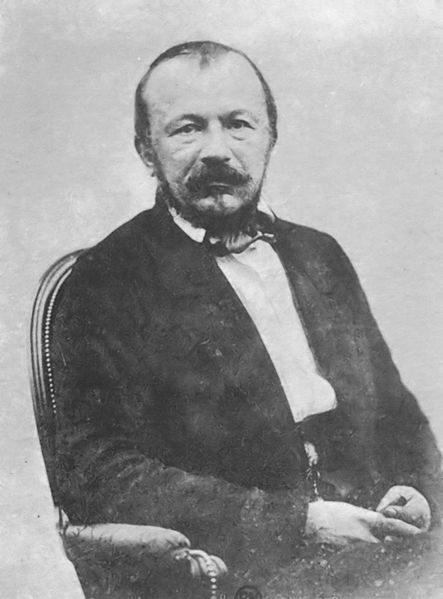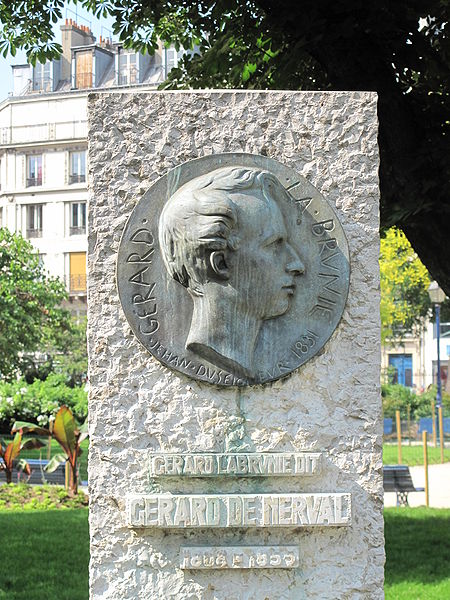<Back to Index>
- Astrophysicist Thomas Gold, 1920
- Poet Gérard de Nerval, 1808
- 5th Prime Minister of South Africa Daniel François Malan, 1874
PAGE SPONSOR


Gérard de Nerval was the nom - de - plume of the French poet, essayist and translator Gérard Labrunie, one of the most essentially Romantic French poets.
Two years after his birth in Paris, his mother died in Silesia while accompanying her husband, a military doctor, a member of Napoleon's Grande Armée. He was brought up by his maternal great - uncle, Antoine Boucher, in the countryside of Valois at Mortefontaine. On the return of his father from war during 1814, he was sent back to Paris. He frequently returned to the countryside of Valois during holidays and later returned to it in imagination in his Chansons et légendes du Valois.
His talent for translation was made manifest in his translation of Goethe's Faust (1828), the work which earned him his reputation; Goethe praised it, and Hector Berlioz later used sections for his legend symphony La damnation de Faust. Other translations from Goethe ensued; in the 1840s, Nerval's translations introduced Heinrich Heine's poems to French readers of the Revue des deux mondes. During the 1820s at college he became lifelong friends with Théophile Gautier and later joined Alexandre Dumas, père in the Petit Cénacle, in what was an exceedingly bohemian set, which was ultimately to become the Club des Hashischins. Nerval's poetry is characterized by Romantic deism. His passion for the 'spirit world' was matched by a decidedly more negative view of the material one: "This life is a hovel and a place of ill repute. I'm ashamed that God should see me here." Among his admirers was Victor Hugo.
Gérard de Nerval's first nervous breakdown occurred during 1841. In a series of novellas, collected as Les Illuminés, ou les précurseurs du socialisme (1852), on themes suggested by the careers of Rétif de la Bretonne, Cagliostro and
others, he described feelings that followed his third insanity.
Increasingly poverty stricken and disoriented, he finally committed
suicide during 1855, hanging himself from a window grating. He left
only a brief note to his aunt: "Do not wait up for me this evening, for
the night will be black and white." He was interred in the Père Lachaise Cemetery in Paris. The influence of Nerval's insistence on the significance of dreams on the Surrealist movement was emphasised by André Breton. The writers Marcel Proust and René Daumal were also greatly influenced by Nerval's work, as was Artaud. Umberto Eco analyses Gérard de Nerval's Sylvie (calling it a "masterpiece") to show the use of temporal ambiguity, demystifying the "mists" during his Six Walks in the Fictional Woods. T.S. Eliot quoted the second line of Nerval's sonnet "El Desdichado" in his poem The Waste Land. Donald Swann set that poem to music as "Je Suis le Ténébreux" (its first words) and Flanders and Swann performed it in their revue At the Drop of a Hat (1956); it appears on the live recording. Clive James, in his songwriting collaboration with Pete Atkin, wrote two lyrics that refer to the poem, "The Prince of Aquitaine" and "The Shadow and the Widower". The British progressive rock music band Pure Reason Revolution draw
extensively from Nerval for influence in their lyrics, which often
revolve around dreams and use a 'stream of consciousness' technique
very similar to Nerval's. The title of their song "Trembling Willows"
is a reference to one of Nerval's poems, "Delfica", and its lyrics take
many of the same images. Similarly, the song "In Aurelia" comes from
Nerval's masterpiece of the same name. The British rock music band Traffic included a song on their album When the Eagle Flies called "Dream Gerrard." The lyrics were written by Vivian Stanshall as a tribute to Nerval. The song contains surreal lyrics like Nerval's work. Nerval is referenced in Richard Wilbur's new book Anterooms in
the poem "A Prelude". The poem is a mockery of the seriousness of
Matthew Arnold and his poem "Dover Beach". Wilbur writes of Matthew
Arnold, "And was upon the point of saying "Ah," / When he perceived,
not far from the great Aiguille, / A lobster led on a leash beside the
sea. / It was Nerval, enjoying his vacances!" Sam Shepard refers to Nerval in his play "Cowboy Mouth."
Nerval had a pet lobster named Thibault which he took for walks in the Palais Royal gardens
in Paris on the end of a blue silk ribbon. Nerval wrote to his close
childhood friend Laura LeBeau, recounting an embarrassing incident that
occurred while on holiday in La Rochelle:
"...and so, dear Laura, upon my regaining the town square I was
accosted by the mayor who demanded that I should make a full and frank
apology for stealing from the lobster nets. I will not bore you with
the rest of the story, but suffice to say that reparations were made,
and little Thibault is now here with me in the city..."
In an article about the life of Nerval by his contemporary,
Théophile Gautier,
Nerval is quoted as having said "Why should a lobster be any more
ridiculous than a dog? ...or a cat, or a gazelle, or a lion, or any
other animal that one chooses to take for a walk? I have a liking for
lobsters. They are peaceful, serious creatures. They know the secrets
of the sea, they don't bark, and they don't gnaw upon one's monadic privacy like dogs do. And Goethe had an aversion to dogs, and he wasn't mad." In the Sam Shepard and Patti Smith play Cowboy Mouth,
the character Cavale is obsessed with Nerval, making numerous
references to him and claiming that Nerval hanged himself on [her]
birthday. It also mentions Nerval having a pet lobster, as above,
amidst other fantastic claims. This may be the inspiration for the
play's character 'Lobster Man.' Flanders and Swann make mention of Nerval's pet lobster in the introduction to "Je Suis Le Ténébreux".